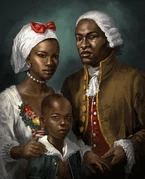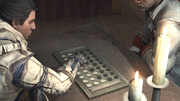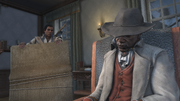- "You've your tools and training. Your targets and goals. And now you have your title. Welcome to the Brotherhood, Connor."
- ―Achilles Davenport, 1770.[src]
Achilles Davenport (1710 – 1781) was the Mentor of the Colonial Brotherhood of Assassins from 1746 until 1763. A man of Caribbean and British descent, Achilles' tenure as leader of the Colonial Assassins saw the Brotherhood strengthen greatly.
After a large-scale attack on the Assassins by the Colonial Rite of the Templar Order in 1763, spanning the Thirteen Colonies, the Brotherhood collapsed and disbanded. Living in exile in his manor, Achilles abandoned the Assassin ideology until his meeting with the young Ratonhnhaké:ton, whom he started to train on the boy's behest. Achilles spent his final years guiding Ratonhnhaké:ton, and this tutelage led to his apprentice's important role in the American Revolution and the extermination of the colonial Templars.
Biography
Life as an Assassin
Recruited in the mid-1730s, Achilles became the Mentor of the Colonial Assassin Brotherhood in 1746, as he had a gift for both recruitment and organization.[2] Under his leadership, the Assassins were based in a manor and spanned across the colonies and most of the frontier; Achilles also strengthened relations with the Iroquois tribes. He was married to a woman named Abigail and fathered a son, Connor Davenport. However, both died of typhoid fever in 1755.
By 1763, the Assassins were decimated to all but himself, during the aftermath of the French and Indian War. Due to this, the Templar Order grew more powerful and was able to capture the defeated Achilles. However, confident that he was no longer a threat, the Templars decided to show mercy, and allowed Achilles to live if he resigned his role as an Assassin. Following this, Achilles went into exile in the wilderness of the Frontier, residing alone at the Davenport Manor for the next six years.
Meeting Ratonhnhaké:ton
- "The world's moved on, boy. Best you do too."
- ―Achilles' discouragement to Ratonhnhaké:ton, 1769.[src]
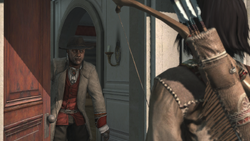
Achilles meeting Ratonhnhaké:ton
In 1769, Achilles was chased by bandits seeking his property. While fleeing their pursuit, he yelled at Ratonhnhaké:ton, a young Kanien'kehá:ka boy, to move out of the way of his horse.
After fighting off the bandits, Achilles was greeted by the boy at his doorstep, who wished to be trained in the ways of the Assassins; Achilles coldly refused, dismissing him. Ratonhnhaké:ton, however, camped in the manor's stables for the night, and knocked on Achilles' door the next morning. Again, Achilles declined, angrily yelling at Ratonhnhaké:ton to leave, prompting the young man to go as far as climbing and attempting to enter the manor from the balcony. Achilles then approached Ratonhnhaké:ton, tripped him onto the floor with his walking cane, and warned him to give up his heroic pursuits or he would end up dead.
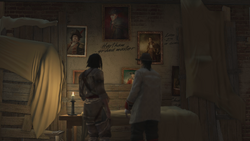
Achilles explaining the Templar order's purpose
Stubbornly, Ratonhnhaké:ton departed and once again camped out in the stables. During the night, he encountered the bandits approaching onto Achilles' property and bravely combated them, though he was knocked to the ground and lay vulnerable. Despite refusing Ratonhnhaké:ton earlier, Achilles rescued the boy by stealthily killing the remaining robbers, and asked him to get rid of the bodies before he could come inside the manor to speak. There, Ratonhnhaké:ton explained that he was guided to find a symbol by a "spirit", eventually leading him to the old man's residence. Achilles in turn revealed that Ezio Auditore da Firenze was the one responsible for the First Civilization contacting the Assassins time and time again, before explaining the nature of the war between the Assassin Brotherhood and the Templar Order.
In the basement, Achilles revealed the portraits of the Templar conspirators: William Johnson, Jonathan Pitcairn, Thomas Hickey, Benjamin Church, Nicholas Biddle, Charles Lee, and the Grand Master Haytham Kenway, whom Ratonhnhaké:ton explained had fathered him with Achilles' Iroquois ally Kaniehtí:io. Achilles agreed to train Ratonhnhaké:ton, to assist him in becoming an Assassin, in order to ultimately eliminate the Templars who were aiming to seize control of the colonies.
Rebuilding the Homestead
- "This crowd is a powder keg - we can't allow him to light the fuse."
- ―Achilles to Connor before the Boston Massacre, 1770.[src]
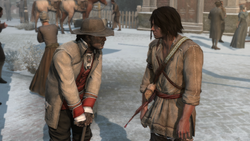
Achilles and Connor in Boston
After six months of rigorous physical and mental training, Ratonhnhaké:ton accompanied Achilles on a trip to Boston to gather materials for the manor's repairs. While in the streets, Achilles sent Ratonhnhaké:ton to a store to purchase items, also giving him the less conspicuous name "Connor," the namesake of his deceased son. Not long after, Achilles and Connor witnessed the Boston Massacre, instigated by Haytham and Charles Lee. Connor attempted to prevent the massacre, but was framed and became a wanted man. In response, Achilles asked Samuel Adams to find Connor, before he returned to the Davenport Homestead.
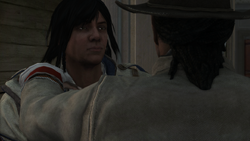
Achilles initiating Connor into the Brotherhood
After Adams had helped Connor clear his name and take a ferry home, Achilles and Connor continued in their efforts of rebuilding the homestead. After six months of further training and lessons in learning the Assassin and Templar history, the Aquila was repaired and fit for setting sail; once he had been given nautical training by Robert Faulkner, Connor returned to the manor. Achilles then led Connor down to the manor's basement, in order to bestow upon him the Assassin robes that resided there.
Though Achilles admitted that the Order usually had a ceremony for such an occasion, neither he nor Connor seemed the type for such formality. Instead, after Connor had donned the robes, Achilles simply verbally welcomed him into the Brotherhood of Assassins.
Hunt for William Johnson
- "Connor, take care. These men are powerful."
- ―Achilles to Connor before going after Johnson, 1770.[src]
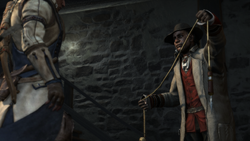
Achilles explaining the rope dart to Connor
Connor donned the Assassin robes and Achilles introduced him to rope darts, which the latter explained to be a tool that resulted from Shao Jun's time in China after meeting Ezio. Some time subsequently, Connor's close friend Kanen'tó:kon visited, revealing that William Johnson intended to purchase the Kanien'kehá:ka land and subjugate their people to relocate. An outraged Connor condemned this as little more than theft, though Achilles advised caution to his pupil, reminding him of how powerful the Templars were; Connor stated that he had no choice, as he had made a promise to protect his people and land. Reluctantly, Achilles instructed him to seek out Samuel Adams in Boston. To his annoyance however, Connor buried a hatchet in the post of the manor to signify the start of a war, though Achilles insisted that he could have used a tree.
As Connor departed, he came across an injured woman named Myriam, who he soon carried back to the mansion so Achilles could tend to her wounds. Connor then set forth to track down the poachers who attacked her, to which Achilles advised Connor use the rope dart he had just given him, to familiarize himself with it. After ridding the Homestead of the poachers, Achilles watched as Connor and Myriam reached a deal to establish hunting rights for the game on their land.
After his work in Boston was completed, which involved destroying a shipment of British tea that Johnson and the Templars had been smuggling to profit from taxation, Connor believed that this would stop the Templars and keep his land safe. However, Achilles warned Connor not to underestimate Templars' resourcefulness. Six months later, Connor set out and successfully assassinated Johnson, ending the Templar threat to steal the Kanien'kehá:ka land.
Beginning of the Revolution
- "It's a start. But to truly be free of Templar influence, all of them must be dealt with in turn. Even your father."
- ―Achilles to Connor after the latter assassinated Johnson, 1775.[src]
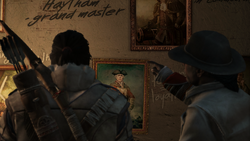
Achilles and Connor discussing their next move
In 1775, Connor was approached by a courier sent by Paul Revere, requesting his help. Connor declined, not considering himself part of the Patriots' struggle. However, Achilles urged Connor to go, since he would need their aid in assassinating John Pitcairn of the British Army, another Templar.
Achilles later requested that Connor retrieve his robes hidden in a cave on the Homestead, since Achilles himself was too frail to make the journey. Connor succeeded, to which Achilles explained that the robes originally belonged to the first Colonial Assassin, John de la Tour, who passed them down to Achilles. Connor joined the Patriots against the British Army, during which he fought in the Battles at Lexington and Concord, and successfully assassinated Pitcairn during the Battle at Bunker Hill. With Pitcairn's death, Connor discovered the Templar plot to murder George Washington.
Protecting Washington
- "Your struggle is the colonists' struggle. In helping one, you help the other."
- ―Achilles to Connor.[src]
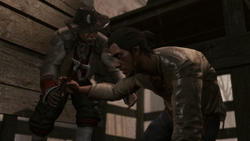
Achilles handing Connor his tomahawk
Connor returned to the Homestead, where Achilles introduced Connor to Benjamin Tallmadge, an Assassin ally. Soon after, Connor traveled to New York to assassinate Thomas Hickey, in order to prevent the planned murder of Washington. However, Connor was imprisoned, framed for the attempted murder of Washington, and sentenced to death.
Hearing the news, Achilles and Connor's Assassin recruits, Stephane Chapheau, Duncan Little and Clipper Wilkinson, traveled to New York to rescue Connor. As Connor was escorted to the gallows by Hickey, Achilles approached Connor from the crowd, reminding him that he still had allies and only needed to signal them. Once called, one of Connor's recruits fired an arrow to sever the noose, though it frayed the rope, with the rope snapping sometime after due to outside interference. Achilles then handed Connor his tomahawk underneath the gallows and Connor surged forth and succeeded in killing Hickey, saving Washington in the process and proving his innocence.
Consequently, both Achilles and Connor traveled to Philadelphia, where Connor went to witness the signing of the Declaration of Independence and meet with Washington. While walking through Independence Hall, Achilles admitted to Connor that he was impressed by his accomplishments so far. However, he attempted to discourage Connor from revealing the Templars to Washington, concerned that it would only harm the Patriots' goal for freedom.
Connor's alliance with Haytham
- "In your haste to save the world, boy - take care you don't destroy it!"
- ―Achilles' warning to Connor.[src]
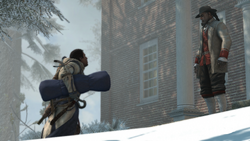
Achilles arguing with Connor
Unfortunately, Achilles and Connor began to drift apart over the next few months, disagreeing over courses of action. While Connor believed he should tell Washington the truth of the Templar plots against him, Achilles argued the opposite, warning that such a misguided effort would only involve and endanger Washington and the lives of his men.
The argument came to a head in the winter of 1777, as Connor decided to inform Washington of the Assassins and Templars. Achilles lectured Connor, informing him that the Assassins were meant to be secretive in order to protect others. In turn, Connor criticized Achilles' inaction as a mentor and even blamed him for failing the Assassin Brotherhood and allowing the Templars to dominate the Colonies. Achilles, however, deplored Connor's actions, warning him that he would only lead people and the world to ruin. Ultimately, Connor decided not to tell Washington once he met with him at Valley Forge.
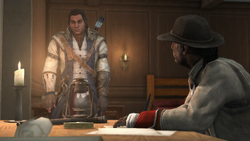
Connor informing Achilles about Haytham
Connor would go on to hunt for Benjamin Church to recover stolen weapons and supplies for Washington. After which, he returned to the Homestead and apologized to Achilles for speaking against him unfairly, though Achilles did admit that he failed the Brotherhood. Connor also revealed that he had met his father, and despite their differences, he believed that an alliance and possibly further peace could be established.
Final days
- "So long as he lives, all are in danger. The same is true for your father. When you first came to me, you understood what had to be done. Swore you'd see it through. If not for the Brotherhood, for your people - and all those threatened by the Templars."
- ―Achilles to Connor, regarding Lee and Haytham.[src]
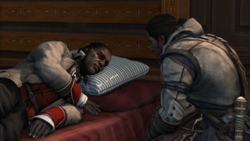
Connor trying to convince Achilles regarding Haytham
By 1781, Achilles had been weakened by age, leaving him bedridden. Connor explained that Charles Lee had been disgraced, but Washington had spared him. Achilles stated that both Lee and Haytham had to die, despite Connor's continued insistence that without Lee, his father may be willing to ally with him. However, Achilles warned Connor not to be misguided by his emotions.
At some point before his death, Achilles requested Connor retrieve a painting from the burned remains of his home in New York. Connor returned, however, Achilles decided to not yet reveal and hang the painting until the time was right.
Death
- "I am grateful to have met you, knowing you will guide this land and these people to a better future. Yours in brotherhood, Achilles."
- ―Achilles' final words written to Connor.[src]
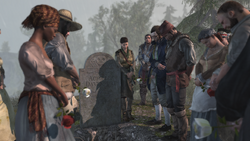
The Homesteaders attending Achilles' funeral
Not long after Connor's errand, Achilles passed away quietly in his sleep. When Connor discovered his body, he also uncovered a note addressed to him in Achilles' handwriting. Written within, Achilles apologized for never being able to say goodbye to Connor properly, and also thanked him, expressing pride and gratitude in Connor for the community he had raised at the Homestead, which had given Achilles hope for the future of America and its people.
A funeral service was held on the hill, behind his manor overlooking the sea, next to the gravestones of his wife and son; this event was attended by all of the inhabitants of the Homestead that Connor had brought together. While others laid roses on his coffin, wrapped in the Davenport Homestead flag, Connor placed a feather on the casket, symbolizing the bond they shared as Assassins.
Following Achilles' passing, Connor inherited his robes, placed the painting of his family on the wall in the manor, and later attended to the grave to pay his respects, hoping that Achilles had found peace and the two would one day meet again.
Characteristics and personality
- "Let me tell you something, Connor. Life is not a fairy tale and there are no happy endings!"
- ―Achilles to Connor.[src]
As a result of losing his family and for failing the Assassin Order under his leadership, Achilles lost his will to fight and became stoic and disillusioned in the Assassins' cause. When first meeting and training Ratonhnhaké:ton, Achilles was a strict, insensitive, and somewhat short-tempered man. He was quick to reprimand, discourage, and correct his naive and brash apprentice.
Connor possessed a highly romanticized and idealized view of the Assassins and his mission, believing that destroying the Templars would grant freedom to all of mankind. This was a strong contrast to Achilles' cynical but rational view of the world. As a result, Achilles often lectured Connor to warn him that his views and actions, while noble, were misguided and potentially dangerous. Connor would argue in disagreement and the two criticized each other on occasions.
Despite this, Achilles was not without heart, as he genuinely cared for Connor and took pride in his accomplishments; so much so that Achilles became an important father figure and mentor. Over the years, Achilles watched as the Homestead flourished into a thriving and loving community, giving Achilles a sense of hope for America's future.
Trivia
- At the Davenport manor, Connor could play games of Fanorona with Achilles. After his death, however, Father Timothy replaces Achilles as Connor's opponent.
- Achilles' nickname, "the Old Man on the Hill," is reminiscent of the moniker given to another Mentor in the Order, Rashid ad-Din Sinan: "the Old Man of the Mountain."
- Coincidentally, both Achilles and Altaïr Ibn-La'Ahad died similar deaths, in that both passed away peacefully in their base of operations, while sitting in a chair and holding something for another Assassin in their hands.
- In The Tyranny of King Washington: The Betrayal, the contents of a man fitting Achilles' description were being rooted through by two guards as Ratonhnhaké:ton escapes prison. Later, Ratonhnhaké:ton finds a Lucid Memory Fragment of Achilles next to an identical hat.
Gallery
References
- ↑ 1.0 1.1 Assassin's Creed: Encyclopedia - Second Edition
- ↑ Assassin's Creed III

